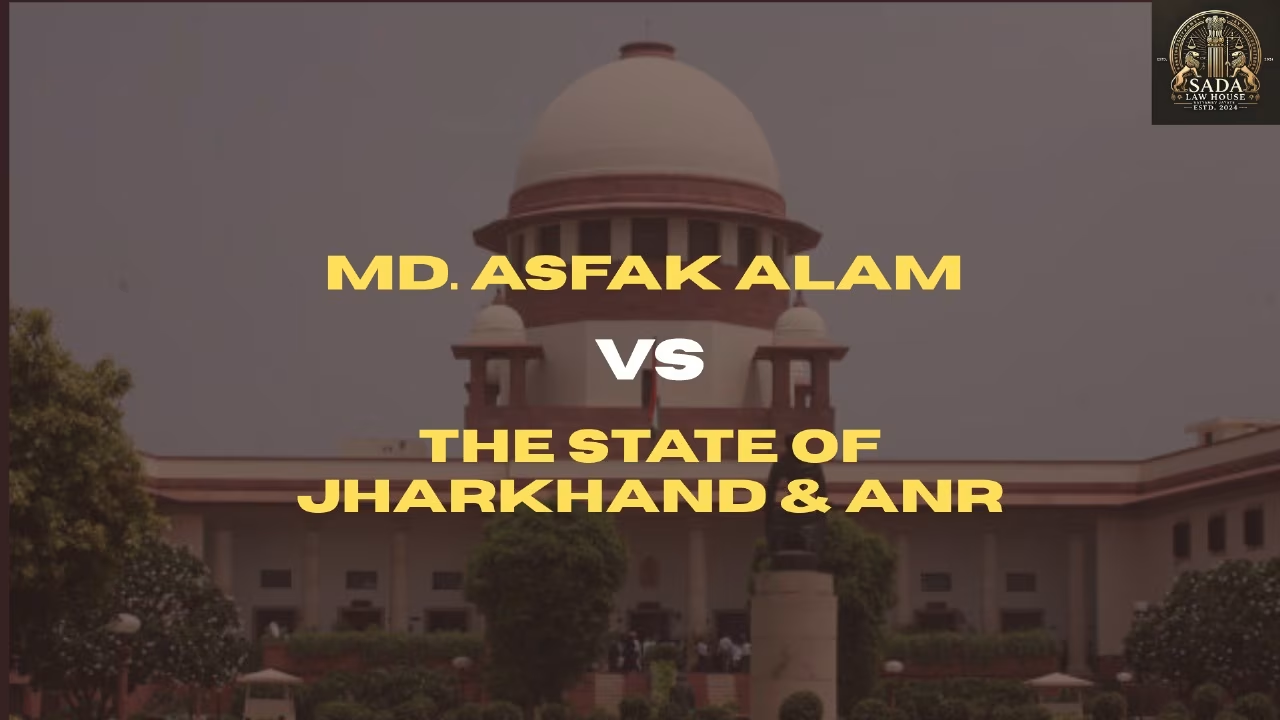MD. Asfak Alam vs. State of Jharkhand & Anr. – Supreme Court Judgment (31 July 2023)
- REHA BHARGAV
- Sep 24, 2025

Explore the Supreme Court’s landmark judgment in MD. Asfak Alam vs. State of Jharkhand & Anr. (2023), where anticipatory bail was granted after the High Court’s refusal. Learn about the case facts, legal issues, and the Court’s emphasis on personal liberty and bail guidelines.
Introduction
On 31 July 2023, the Supreme Court of India delivered a significant ruling in the case of MD. Asfak Alam vs. State of Jharkhand & Anr. The case revolved around the denial of anticipatory bail by the Jharkhand High Court, despite the appellant’s cooperation with the investigation and the filing of a charge-sheet.
The Court, presided over by Justice S. Ravindra Bhat and Justice Arvind Kumar, overturned the High Court’s decision and reinforced the importance of personal liberty under Article 21 of the Constitution.
Facts of the Case
Marriage and Dispute
The appellant married the respondent on 5 November 2020.
The appellant alleged that the marriage was troubled due to interference from the wife’s father, which created tension between families.
FIR and Allegations
On 2 April 2022, an FIR was registered at Gumla Mahila Police Station (Case No. 07/2022) against the appellant and his family.
Alleged offences included:
The appellant argued that the FIR was filed without following the mandatory procedure laid down in Lalita Kumari v. Govt. of UP.
Bail Proceedings
Anticipatory bail application under Section 438 CrPC was first rejected by the Sessions Court (28 June 2022).
The appellant then approached the High Court, which initially granted interim protection (8 August 2022).
After investigation, a charge-sheet was filed and cognizance was taken by the trial court on 1 October 2022.
Despite this, the Jharkhand High Court dismissed the anticipatory bail plea on 18 January 2023 and directed surrender for regular bail.
Issue of the Case
The primary issue was:
Whether the appellant was entitled to anticipatory bail despite charges under Section 498A IPC and Dowry Prohibition Act, given that he had cooperated with the investigation, and the charge-sheet had already been filed?
Judgment
The Supreme Court of India allowed the appeal and set aside the Jharkhand High Court’s order. Key findings included:
There were no exceptional circumstances justifying the denial of anticipatory bail.
The appellant had fully cooperated with the investigation.
A charge-sheet had already been filed, eliminating the risk of tampering or absconding.
The Court granted anticipatory bail and reiterated that personal liberty must not be curtailed without compelling reasons. It also reinforced the guidelines laid down in Arnesh Kumar v. State of Bihar to prevent unnecessary arrests in offences punishable up to seven years.
Furthermore, the Court directed all High Courts and State Police Authorities to circulate and enforce these guidelines, ensuring compliance within a fixed time frame.
Conclusion
The ruling in MD. Asfak Alam vs. State of Jharkhand & Anr. highlights the judiciary’s commitment to safeguarding fundamental rights and ensuring that anticipatory bail is not denied arbitrarily. By overturning the High Court’s order, the Supreme Court emphasized the importance of fair investigation, judicial balance, and personal liberty.
This judgment serves as a reminder that bail should be the rule and jail the exception, especially when no compelling reason exists for arrest.
Case Laws






